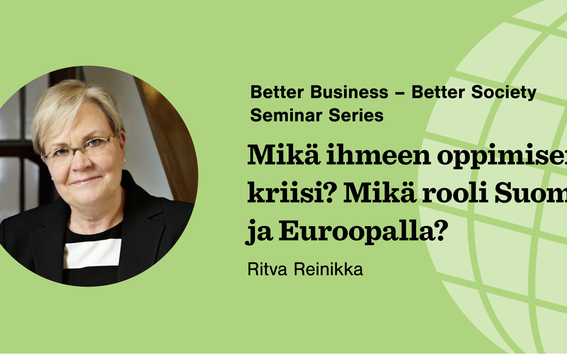How can there be an education crisis when the children are going to school?

The School of Business at Aalto University also teaches and conducts research in education issues both at the national and global levels. Education undoubtedly has value as such, but it also has indirect value through better productivity and higher incomes. Human capital is a basic pillar of growth theory, and so are innovations.
Professor of Practice Ritva Reinikka has studied education in developing countries for decades, especially in her former job at the World Bank, and now also at Aalto University. She has also long been involved in practical operative work aimed at funding and improving educational systems in developing countries.
‘Already 25 years ago we used research to find out if state aid to schools was reaching its intended targets in Uganda. We also looked for reasons why that did not always happen, and what could be done about it. Similar studies have been conducted since then in different parts of the world, and are still taking place. In recent times we have focused on teachers and their skills both in content and pedagogics’, Ritva Reinikka says.
School attendance has increased vastly in the past few decades. Nearly all children in the world are starting school today. It is a huge effort and achievement on the part of humanity, and it has happened in our lifetime. This achievement is important to keep in mind as we ponder the crisis in learning. On the other hand, we need to recognise that attending school and learning do not always mean the same thing.
***
We warmly welcome you to hear more views on the topic from Ritva Reinikka and her guests, Olli-Pekka Heinonen, Director General at the Finnish National Agency of Education and Jutta Urpilainen, the European Commissioner for International Partnerships, on Thursday, 4 March 2021, from 17.00 to 18.00.
The Better Business – Better Society webinar will be in Finnish, and the YouTube link to it is on the aforementioned event page. The webinar is open to all and is free of charge.
Read more news

Learning to slow down: cold-water swimming benefits explored in new study
Swimming in cold water offers a temporal slowdown, promoting stress management and mental clarity that lingers long after the experience, says research from Finland.
Alum Ding Ma: 'I want to represent a new-era Mayor'
Ding Ma, who will start as the Mayor of Savonlinna at the age of 37, studied Information and Service Management at the School of Business.
OpenLearning additional maintenace downtime on Wednesday, 11 March from 9:00 AM to 12
The system will be unavailable during the update.






